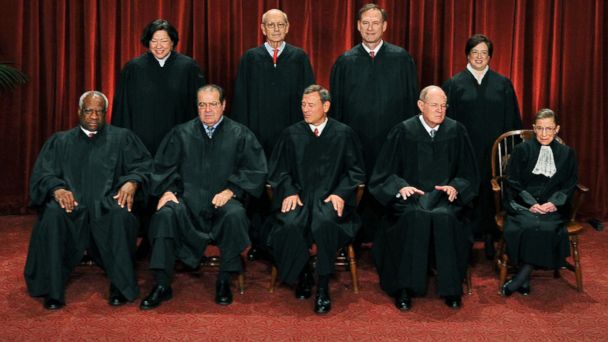What the Supreme Court Did (and Did Not) Reveal About 3 Hot Button Issues

(Tim Sloan/AFP/Getty Images)
Without uttering a word from the bench, the Supreme Court acted on major hot button issues in the last month concerning voting rights, abortion and gay marriage.
The cases weren't on the Court's argument calendar. Parties were either asking the Court to act on an emergency basis to freeze a lower court decision, or requesting that the Court step in and take a case for later in the term. The Court responded by issuing orders (one came at 5 a.m. on Saturday!) that were usually only a few sentences long. We never got the majority's reasoning, but in some cases a few of the Justices released a public dissent.
A Hairy Question For The Supreme Court: Should Prisoners Be Able to Grow Beards?
What the Supreme Court's Move on Gay Marriage Means
Here's some of what we know, and what we don't about the hot button issues:
Voting Rights:
The court sent a strong signal that it didn't like voting changes made too close to an election. It allowed voting restrictions to remain in effect in North Carolina, Texas and Ohio. It stopped Wisconsin's Voter ID law from going into effect.
But Justice Ruth Bader Ginsburg, the most senior member of the liberal wing of the Court, had a couple of things she wanted to make clear: the country, she believes, is now feeling the impact of the Court's 2013 decision in Shelby County that invalidated a key provision of the Voting Rights Act. In two separate dissents she pointed out that voting restrictions in Texas and North Carolina would most likely not have been able to stand in pre-Shelby days. She said the Texas Voter ID law "may prevent more than 600,000 registered Texas voters (about 4.5% of all registered voters) from voting in person for lack of compliant identification."
In an interview last Sunday with NPR's Nina Totenberg, Ginsburg explained why she pulled an all-nighter to write her dissent in the Texas case. She thought the Court might create more confusion at the polls by allowing the new Texas Voter Id law to remain in effect, rather than reverting to the state's previous voter id law. She said the new law hadn't been tested in a federal election and that poll workers hadn't received enough training. "Poll watchers," Ginsburg said, "were more familiar with the old procedure than they were with this new procedure."
Abortion:
The Court blocked part of Texas' abortion law from going into effect pending appeal. Pro choice groups praised the court's order saying that several abortion clinics-forced to close because of a lower court ruling - would be able to reopen while the merits of the case were argued.
What's interesting in this case is that while Justices Antonin Scalia, Samuel Alito and Clarence Thomas publicly dissented, Chief Justice John Roberts and Justice Anthony Kennedy were publicly silent.
The court's action was not a ruling on the merits, it simply granted an emergency application from pro-choice groups fearful that the state would be left with just 7 clinics. But the silence on the part of Roberts and Kennedy gave the groups some hope that they might be able to get 5 votes down the road to permanently strike down provisions of the law.
Gay Marriage:
The justices cleared the way for gay marriage in several states when the Court declined to step in and review seven cases from three appeals courts. President Obama went as far as telling the New Yorker that the Court's action was as "consequential" as anything the Court has done.
We may never know what went on behind closed doors when the Justices made their decision. It would have taken 4 votes to grant any one of the cases. Every Justice knew that if the Court chose not to take up the cases, in short order 35 states would allow gay marriage. Were the liberals hoping to get more states on the book allowing gay marriage before stepping in?
Did the Chief want to decide the issue once and for all? The only guidance we had occurred away from the Court. Ginsburg, speaking presumably for herself, pointed out in her interview that so far all the appeals courts have struck down state bans, and there is no split in the circuit courts. "When there's no disagreement among the Courts of Appeals, we don't step in," Ginsburg said.